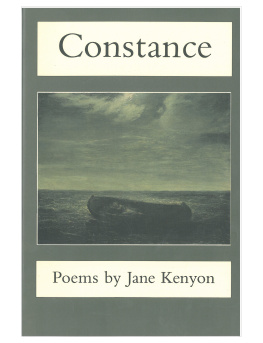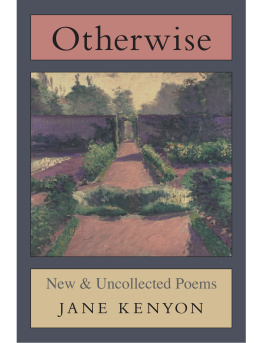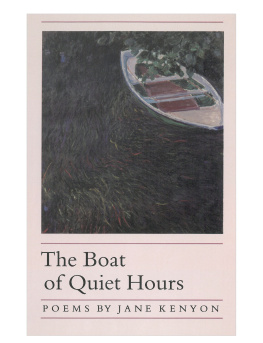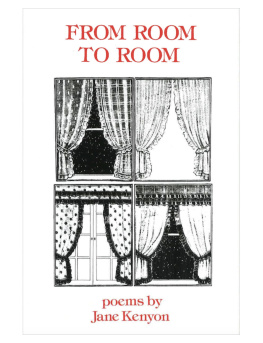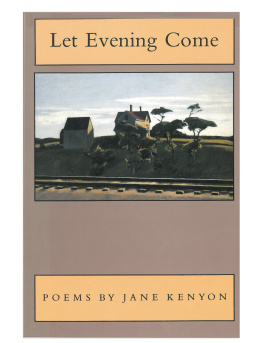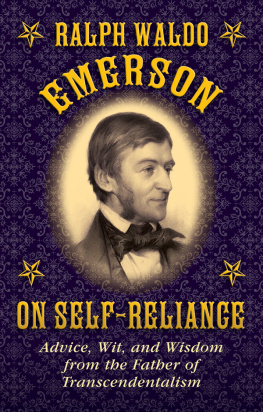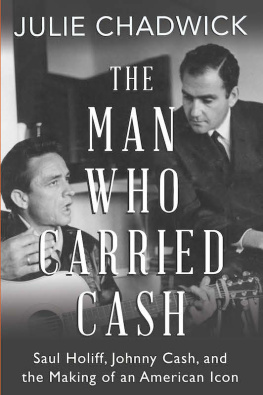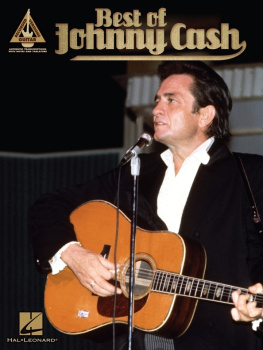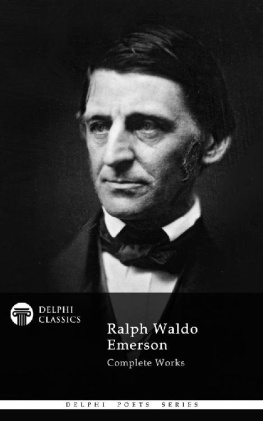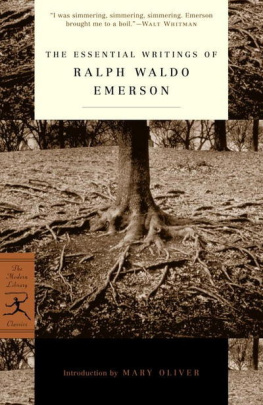Constance
(1993)
poems
by
JANE KENYON
Constance
(1993)
Perkins, ever for Perkins
From Psalm 139
O Lord, thou hast searched me...
Whither shall I go from thy spirit?
or whither shall I flee from thy presence?
If I ascend up into heaven, thou art there:
if I make my bed in hell, behold, thou art there.
If I take the wings of the morning,
and dwell in the uttermost parts of the sea;
Even there shall thy hand lead me,
and thy right hand shall hold me.
If I say, Surely the darkness shall cover me;
even the night shall be light about me.
Yea, the darkness hideth not from thee;
but the night shineth as the day:
the darkness and the light are both alike to thee...
I
The Progress of the Beating Heart
August Rain, after Haying
Through sere trees and beheaded
grasses the slow rain falls.
Hay fills the barn; only the rake
and one empty wagon are left
in the field. In the ditches
goldenrod bends to the ground.
Even at noon the house is dark.
In my room under the eaves
I hear the steady benevolence
of water washing dust
raised by the haying
from porch and car and garden
chair. We are shorn
and purified, as if tonsured.
The grass resolves to grow again,
receiving the rain to that end,
but my disordered soul thirsts
after something it cannot name.
The Stroller
1949
It was copen blue, strong and bright,
and the metal back looked like caning
on a chair. The peanut-shaped tray
had a bar with sliding beads:
red, yellow, blue, green, white.
It was hard for Mother to push the stroller
on the sandy shoulders of the road.
Sitting in the stroller
in the driveway of the new house
on a morning in early spring, trees
leafing out, I could hear cows
lowing in their stalls across the road,
and see geese hissing and flapping
at a sheep that wandered too close
to the goslings. From the stroller I surveyed
my new domain like a dowager queen.
When something pleased me I kicked
my feet and spun the bright beads.
Spittle dropped from my lower lip
like a spider plunging on its filament.
1991
Mother is moving; were sorting
through fifty years accumulations
a portfolio of Fathers drawings
from his brief career in Architecture
School, exercises in light and shadow,
vanishing point; renderings of acanthus
cornices, gargoyles....Then I come upon
a drawing of my stroller, precisely to scale,
just as I remember it.
And here is a self-portrait, looser,
where he wears the T-shirt whose stripes
I know were red and white
although the drawing is pencil.
Beside Father, who sits in a blue chair
that I remember, by a bookcase I remember,
under a lamp I remember, is the empty stroller.
1951
He was forty-seven, a musician
who took other jobs to get by,
a dreamer, a reader, a would-be farmer
with weak lungs from many pneumonias
and from playing cocktail piano
late in smoky bars. On weekend mornings
we crept around so he could sleep until ten.
When he came home from his day-job
at the bookstore, I untied his shoes.
I waited all day to untie them,
wanting no other happiness. I was four.
Fie never went to town without a suit
and tie, a linen handkerchief
in his pocket, and his shoes
were good leather, the laces themselves
leather. I loved the rich pungency
of his brown, well-shined, warm shoes.
1959
Mother took in sewing.
One by one Ann Arbors bridge club
ladies found her. They pulled into our drive
in their Thunderbirds and Cadillacs
as I peered down between muslin curtains
from my room. I lay back on the bed, thinking
of nothing in particular, until they went
away. When I came downstairs the scent
of cigarettes and perfume persisted in the air.
One of them I liked. She took
her two dachshunds everywhere
on a bifurcated leash; they hopped comically
up the porch steps and into our house.
She was Italian, from Modena, displaced,
living in Ann Arbor as the wife
of a Chrysler executive. She never wore
anything but beige or gray knits.
She was six feet tall and not ashamed of it,
with long, loose red hair held back
by tortoiseshell combs. She left cigarette
butts in the ashtray with bright red
striated crescents on them.
She was different from the others,
attached to my mother in the way
European women are attached
to their dressmakers and hairdressers.
When she traveled abroad
she brought back classical recordings
and perfume. I thought I would not mind
being like Marcella, though I recognized
that she was lonely. Her husband traveled
frequently, and she had a son
living in Florence who never came home.
His enterprises were obscure....
Marcella had her dogs, her solitude,
her eleganceat once sedate and slightly
wildand, it seemed, a new car every time
the old one got dirty, a luxury
to which she seemed oblivious.
1991
Disturbed but full of purpose, we push
Fathers indifferent drawings into the trash.
Mother saves the self-portrait and the acanthus
cornice. I save only the rendering
of the stroller, done on tracing paper, diaphanous.
Looking at it
is like looking into a mirror
and seeing your own eyes and someone elses
eyes as well, strange to you
but benign, curious, come
to interrogate your wounds, the progress
of your beating heart.
The Argument
On the way to the village store
I drive through a downdraft
from the neighbors chimney.
Woodsmoke tumbles from the eaves
backlit by sun, reminding me
of the fire and sulfur of Grandmothers
vengeful God, the one who disapproves
of jeans and shorts for girls,
dancing, strong waters, and adultery.
A moment later the smoke enters
the car, although the windows are tight,
insinuating that I might, like Judas,
and the foolish virgins, and the rich
young man, have been made for unquenchable
fire. God will need something to burn
if the fire is to be unquenchable.
All things work together for the good
for those who love God, she said
to comfort me at Uncle Hazens funeral,
where Father held me up to see
the maroon gladiolus that trembled
as we approached the bier, the elaborate
shirred satin, brass fittings, anything,
oh, anything but Uncles squelched
and made-up face.
No! NO! How is it good to be dead?
I cried afterward, wild-eyed and flushed.
Gods ways are not our ways,
she said then out of pity
and the wish to forestall the argument.
Biscuit
The dog has cleaned his bowl
and his reward is a biscuit,
which I put in his mouth
like a priest offering the host.
I cant bear that trusting face!
He asks for bread, expects
bread, and I in my power
might have given him a stone.
Not Writing
A wasp rises to its papery
nest under the eaves
where it daubs
at the gray shape,
but seems unable
to enter its own house.
Windfalls
The storm is moving on, and as the wind
rises, the oaks and pines let go
of all the snow on their branches,
an abrupt change of heart,
and the air turns utterly white.
Woooh, says the wind, and I stop
where I am, put out my arms
and look upward, allowing
myself to disappear. It is good
to be here, and not here....
I see fresh cloven prints
under the apple tree, where deer come
nosing for windfalls. They must be
near me now, and having stopped
when I stopped, begin to move again.
II
Tell me how to bear myself...
Next page
